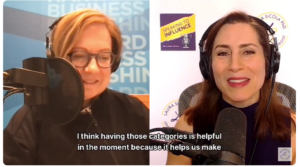When I first launched my coaching business focusing on helping people – at the time, particularly women – find their leadership voice, I had a rather unexpected conversation with my aunt, a retired VP and finance executive from a large mortgage services company.
She recalled: “That reminds me of a time years ago when there was a young woman on my team, and one day my boss (a man) said to me, ‘Don’t bring her to any more meetings; I can’t stand the sound of her voice.’”
“What did you do?” I asked, incredulously.
“I just stopped bringing her to meetings with him,” she shrugged. “I was so surprised by the comment, but I didn’t know what else to do.”
“Did you tell her why? Or try to help her with her communication skills?” I prodded.
“No,” she began. “I never noticed anything particularly problematic about her voice in the first place, and I wouldn’t have known how to help even if I did.”
Given that this was decades after the fact and my aunt had long since retired, I didn’t see any point in pushing the topic. But my heart sank a bit, wondering what kind of negative, long-term ripple effect that moment had on the young woman’s career, unbeknownst to her.
I found myself mentally cycling through a variety of different approaches I might have taken in that situation:
- Inquisitive: “What is it about her voice that bothers you?”
- Empathetic: “I’m sorry to hear it’s been uncomfortable for you. What can I do to help make her participation better received? If she stops coming, that could have a negative effect on her career development, and I’m sure that’s not what anyone wants.”
- Pragmatic/Proactive: “Help me understand the nature of the problem so we can get her some training or find the right resources to help her; she’s very coachable and I know she wants to do well.”
- Cautionary: “I think we need to find a different solution; if it ever got back to her that that was the reason she was left out, she could file suit.”
- Snarky: “Wow. Hey boss? The ‘70s called and they want their shameless sexism back.”
Okay, I’d never actually have said that last one, but the thought of it probably would have crossed my mind, at least for a split second.
But would I have had the guts to just come right out and say: “Respectfully, no. It’s not okay to shut her out just because you don’t like her voice. She’s incredibly smart, hard-working, and an important asset to this team, and she deserves to be here”?
Fortunately, (a) I wasn’t there and didn’t have to make the call, and (b) there are other leaders who have made the hard choice to stand up for others and for what’s right, putting their own necks on the line in the process.
Amy Bernstein, the editor at Harvard Business Review and the vice president and executive editorial director at Harvard Business Publishing, just so happens to be one of those leaders.
In this episode of Speaking to Influence podcast, Amy tells us about a time when she had to do just that.

When a former bully-of-a-boss lit into one of Amy’s direct reports in a meeting, she followed him back to his office when the meeting was over, closed the door, stared him down and said point-blank:
“If you ever do that again, I’m leaving.”
His response to that was telling of many things, but her approach worked.
Listen to the full conversation here or watch the video on YouTube hereto find out how it worked, and more importantly, why.
Let’s face it, at some point or other from time to time, we all need to be called out (in private) on our “stuff.”
And it won’t surprise you to know that what you say in those moments matters just as much as how you say it.
There are better ways and worse ways, constructive and destructive ways, direct and indirect ways, face-saving and face-threatening ways.
To learn how to find those just-right nuances, you can always check out my book Speaking to Influence: Mastering Your Leadership Voice, in paperback or Audible.
But we all have a role to play in creating the culture we want to work in, and sometimes that means lovingly redirecting the boss (who is also human and has bad days) when they get off course.
Keep tuning in to the podcast to get more ideas about how to do exactly that.
Don’t forget to rate the Speaking to Influence podcast on https://ratethispodcast.com/influence – thank you!



